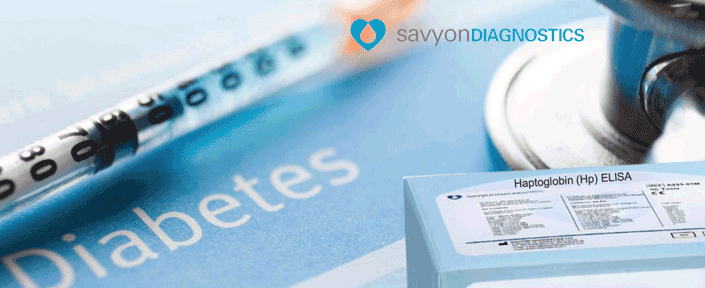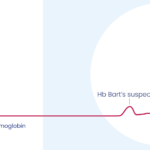Savyon Haptoglobin Typing Test
Products are for professional/laboratory use only.
Savyon Diagnostics is offering novel ELISA test for Haptoglobin (Hp) type determination in diabetic patients, which is directly associated with the risk of developing cardiovascular complication.
This test will give the patient and the physician information as to which of the three Hp types the patient has: Hp 1-1, Hp 2-1, or Hp 2-2.
Features:
- Simple – ELISA test, no need for electrophoretic analysis
- Rapid – 1 1/2 hours to process up to 92 samples
- Accurate – High sensitivity, specificity, PPV & NPV (see clinical performance data)
- Clear – Simple interpretation of results
- Versatile – Only 15 µl of serum or plasma are required
- Automated – Compatible with ELISA automation
Haptoglobin (Hp) is a normally occurring acute phase serum protein whose primary physiological role is to scavenge free haemoglobin (Hb), a potent oxidizing agent, from the circulation (1). Free Hb, released during haemolysis of red blood cells, promotes the accumulation of hydroxyl free radicals which can cause oxidative damage to tissues. Hp acts as an antioxidant by first forming complexes with Hb and then clearing the complexes from the circulation by uptake via the CD163 macrophage receptor (2).
Hp is polymorphic in man and occurs as either one of three phenotypes, Hp 1-1, Hp 2-1, or Hp 2-2. The prevalence of the three phenotypes of Hp is 16% Hp 1-1, 48% Hp 2-1, and 36% Hp 2-2 (1). Substantial evidence supports the pathogenetic role for the Hp 2-2 phenotype (3). The presence of the Hp 2-2 phenotype in diabetic individuals predicts cardiovascular risk. Several longitudinal studies have established that the Hp 2-2 phenotype is an independent risk factor for cardiovascular disease in type 1 and in type 2 diabetics (3, 4-7). Although the distribution of Hp phenotypes is not different in individuals with or without diabetes (1), the Hp 2-2 phenotype was shown to be a risk factor only in patients with diabetes.
The Haptoglobin (Hp) Typing ELISA offered by Savyon Diagnostics is intended for use for diabetic patients only, for the qualitative determination of Hp phenotypes (Hp 1-1, Hp 2-1, or Hp 2-2) in human serum/plasma, to be used in conjunction with clinical evaluation and patient assessment as an aid in predicting risk of coronary arterial and cardiovascular disease.
*RESEARCH USE ONLY
References
- Langlois, M.R. and Delanghe, J.R. Biological significance of haptoglobin polymorphism in humans. Clinical Chemistry 42:1589-1600 (1996).
- Kristiansen, M., Graversen, J.H., Jacobson, C., et al. Identification of the hemoglobin scavenger receptor. Nature 409:198-201 (2001).
- Costecou, T., Ferrell, R.E., Orchard, T.J. Haptoglobin genotype: a determinant of cardiovascular complication risk in type 1 diabetes. Diabetes 57:1702-1706 (2008).
- Levy, A.P., Hochber, I. Jablonski, K., et al. Haptoglobin phenotype is an independent risk factor for cardiovascular disease in individuals with diabetes: the strong heart study. Journal of the American College of Cardiology 40:1984-1990 (2002).
- Roguin, A., Koch, W., Kastrati, A. et al. Haptoglobiin genotype is predictive of major adverse cardiac events in the 1 year period after percutaneous transluminal coronary angioplasty in individuals with diabetes. Diabetes Care 26:2628-2631 (2003).
- Suleiman, M., Aronson, D., Asleh, R., et al. Haptoglobin polymorphism predicts 30-day mortality and heart failure in patients with diabetes and acute myocardial infarction. Diabetes 54:2802-2806 (2005).
- Milman, U., Blum, S., Shapira, C., et al. Vitamin E Supplementation reduces cardiovascular events in a subgroup of middle-aged individuals with both type 2 diabetes mellitus and the haptoglobin 2-2 genotype. Atherosclerosis, Thrombosis, and Vascular Biology 28:341-347 (2007).







